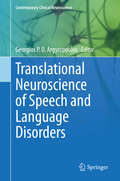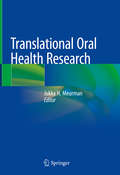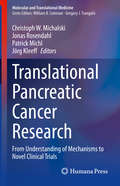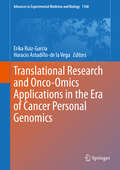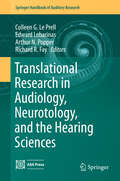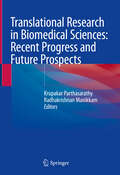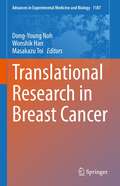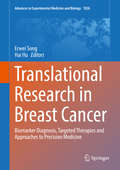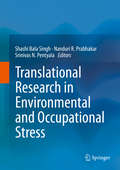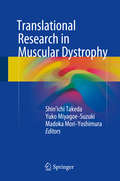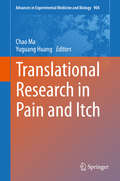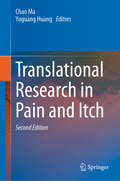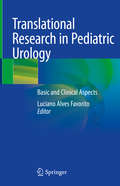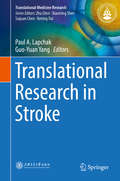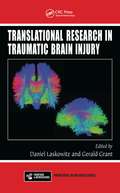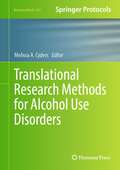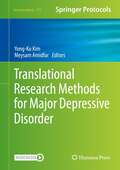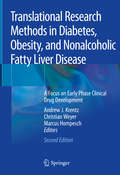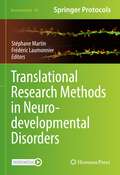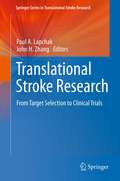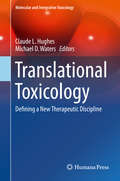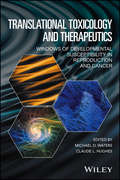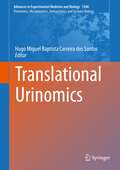- Table View
- List View
Translational Neuroscience:
by James E. Barrett Joseph T. Coyle Michael WilliamsTranslational neuroscience is at the heart of clinical advancement in the fields of psychiatry, neurology and neurodevelopmental disorders. Written and edited by leading scientists and clinicians, this is a comprehensive and authoritative analysis of this emerging strategy for developing more effective treatments for brain disorders. Introductory chapters bring together perspectives from both academia and industry, while subsequent sections focus on disease groups, including bipolar disorder and depression, attention deficit hyperactivity disorder, substance abuse, autism, Alzheimer's disease, pain, epilepsy, Parkinson's disease and multiple sclerosis. Each section includes topical introductory and summary chapters, providing an overview and synthesis of the field. Translational Neuroscience: Applications in Neurology, Psychiatry, and Neurodevelopmental Disorders is an important text for clinicians, scientists and students in academic settings, government agencies and industry, as well as those working in the fields of public health and the behavioural sciences.
Translational Neuroscience: A Guide to a Successful Program
by Edgar Garcia-RillTranslational research looks to take the latest innovations made in the laboratory setting to translate findings into effective and sustainable medical interventions and improved preventative measures. Funding support is increasingly tied to practical healthcare outcomes, with this trend likely only to increase in coming years, Translational Neuroscience: A Guide to a Successful Program, is a timely guide to developing research programs that bring translational advances to the forefront. Translational Neuroscience provides practical information from scientists with first-hand experience in developing a cutting-edge translational facility. The book opens with chapters that provide guidance to organizing a center for translational science. Chapters look at topics ranging from mentoring and career planning for clinician scientists to improving the design of core facilities and addressing infrastructure needs. The second half of the book provides valuable case studies of translational neuroscience in action, with examples ranging from using to transcranial magnetic stimulation to studies on drug abuse and telemedicine applications. The final chapter looks to the future of basic science research, how academic health centers can be reorganized, and how future generations of translational neuroscientists can be trained. Translational Neuroscience provides a blueprint to developing an innovative and successful translational research program. Deans, department chairs, academic health center administrators, and researchers will find this guide useful for drafting programs in translational research and avoiding costly pitfalls. While grounded in examples from basic neuroscience research, this book will be a useful tool to all scientists looking to develop centers of translational science across research disciplines.
Translational Neuroscience of Speech and Language Disorders (Contemporary Clinical Neuroscience)
by Georgios P. D. ArgyropoulosThis book provides the first presentation of the state-of-the-art in the application of modern Neuroscience research in predicting, preventing and alleviating the negative sequelae of neurodevelopmental, acquired, or neurodegenerative brain abnormalities on speech and language. To this end, this edited volume brings together contributions from several leading experts in a markedly broad range of disciplines, comprising Neurology, Neurosurgery, Genetics, Engineering, Neuroimaging and Neurostimulation, Neuropsychology, and Speech and Language Therapy.
Translational Oral Health Research
by Jukka H. MeurmanThis book is the first to be devoted to translational research – which aims to expedite the transfer of knowledge gained in the lab to clinical practice – within the field of oral health. It is examined how basic sciences and basic research are providing new methods and materials that will enable clinicians to treat patients more effectively. Readers will gain a translational perspective on a variety of oral conditions and related systemic diseases. Individual chapters are devoted to such topics as dental biomaterials, implants, and tissue engineering. The importance of evidence-based research and the roles and comparative value of preclinical and clinical trials are also highlighted. Knowledge of translational and clinical research is essential in understanding how new inventions and developments are being accomplished, and what regulations and guidelines need to be taken into account when planning studies, and not forgetting the ethical aspects of any research. Translational Oral Health Research is the first book to be devoted entirely to the subject, and it will be of interest to both researchers and practitioners.
Translational Pancreatic Cancer Research: From Understanding of Mechanisms to Novel Clinical Trials (Molecular and Translational Medicine)
by Christoph W. Michalski Jonas Rosendahl Patrick Michl Jörg KleeffThis book incorporates a multi-disciplinary approach to present how research results can be translated into clinical trials. The first part begins with a chapter on variants of pancreatic cancer, precursor lesions and groups of people at risk to developing the disease. There is a particular focus on intraductal papillary mucinous neoplasia as a large-scale clinical challenge in pancreatology. The next two parts focus on diagnosis, biomarkers and stratification that emphasize how various approaches to biomarker development are important as both prognostic and predictive tools. The final part consists of personalized treatment approaches that include preclinical models of pancreatic cancer and stromal, epigenetic and metabolism targeting as promising approaches to be translated into early phase clinical trials. Chapters within this part also deal with approaches that are close to being implemented in clinical practice or are already being tested in (early) clinical trials, such as those that targeting the immune systems and strategies to overcome immunotherapy resistance; phase 1 clinical trials and translational approaches in surgical treatment. Written by experts in their fields, Translational Pancreatic Cancer Research provides an outlook towards future directions by integrating information both from basic and clinical research and though demonstrating pathways to better understanding pancreatic cancer and current approaches to translating these into clinical practice.
Translational Research and Onco-Omics Applications in the Era of Cancer Personal Genomics (Advances in Experimental Medicine and Biology #1168)
by Erika Ruiz-Garcia Horacio Astudillo-de la VegaBeing a complex disease that affects millions of people world over, cancer research has assumed great significance. Translational cancer research transforms scientific discoveries in the laboratory into clinical application to reduce incidence of cancer, morbidity and mortality. On the other hand, personalized medicine in cancer is the concept that selection of a treatment should be tailored according to the individual patient’s specific genomic characteristics, including mutations, chromosomal aberrations, protein interactions, and SNPs, and even more, taking into account the inmume system, the metabolism and maybe in the next future also the microbiome.
Translational Research in Audiology, Neurotology, and the Hearing Sciences
by Colleen G. Le Prell Edward Lobarinas Arthur N. Popper Richard R. FayTranslational Research is the interface between basic science and human clinical application, including the entire process from animal studies to human clinical trials (phases I, II, and III). Translational Research moves promising basic science results from the laboratory to bedside application. Yet, this transition is often the least-defined, least-understood part of the research process. Most scientific training programs provide little or no systematic introduction to the issues, challenges, and obstacles that prevent effective research translation, even though these are the key steps that enable high-impact basic science to ultimately result in significant clinical advances that improve patient outcome. This volume will provide an overview of key issues in translation of research from "bedside to bench to bedside", not only from the perspective of the key funding agencies, but also from the scientists and clinicians who are currently involved in the translational research process. It will attempt to offer insight into real-world experience with intellectual property and technology transfer activities that can help move auditory technologies ahead, as scientists and clinicians typically have little or no formal training in these areas. Translational Research in Audiology and the Hearing Sciences will be aimed at graduate students and postdoctoral investigators, as well as professionals and academics. It is intended to function as a high-profile and up-to-date reference work on Translational Research in the auditory sciences, emphasizing research programs in the traditional areas including drugs and devices, as well as less traditional, still emerging, areas such as sensorineural hearing loss, auditory processing disorder, cochlear implants and hearing aids, and tinnitus therapies.
Translational Research in Biomedical Sciences: Recent Progress and Future Prospects
by Krupakar Parthasarathy Radhakrishnan ManikkamThe main objective of translational health science is to concentrate on discovering healthcare products for all people where care gaps exist. This book examines the applications of translational research, identifies its difficulties, outlines its essential characteristics, considers healthcare management strategies, and examines the public's perspectives today. This book assists aspiring implementation scientists in researching this area because the discipline is still relatively young for the wide range of researchers tackling the challenge of clinical and translational science, a field dedicated to examining human health and disease, interventions, and outcomes to develop new treatment approaches, devices, and modalities to improve health. This book Edition is the most authoritative and timely resource that introduces new physiological and therapeutic processes to engage the fastest-growing scientific outcomes from academic and industrial research. The chapters in this book give insights into perspectives on the field of clinical and translational science and discuss artificial intelligence in drug development and conventional and novel clinical trial designs. There is a lot of hope that using artificial intelligence (AI) will significantly advance all facets of healthcare, from diagnosis to therapy. AI is prepared to assist medical staff with various duties, including administrative workflow, clinical documentation, patient outreach, and specialist support like image analysis, medical device automation, and patient monitoring. Some of the most important uses of AI in healthcare will be covered in this book by eminent Scientists, Academicians, and Industrial persons from both clinical and non-clinical fields.
Translational Research in Breast Cancer (Advances in Experimental Medicine and Biology #1187)
by Dong-Young Noh Wonshik Han Masakazu ToiThis book describes recent advances in translational research in breast cancer and presents emerging applications of this research that promise to have meaningful impacts on diagnosis and treatment. It introduces ideas and materials derived from the clinic that have been brought to "the bench" for basic research, as well as findings that have been applied back to "the bedside". Detailed attention is devoted to breast cancer biology and cell signaling pathways and to cancer stem cell and tumor heterogeneity in breast cancer. Various patient-derived research models are discussed, and a further focus is the role of biomarkers in precision medicine for breast cancer patients. Next-generation clinical research receives detailed attention, addressing the increasingly important role of big data in breast cancer research and a wide range of other emerging developments. An entire section is also devoted to the management of women with high-risk breast cancer. Translational Research in Breast Cancer will help clinicians and scientists to optimize their collaboration in order to achieve the common goal of conquering breast cancer.
Translational Research in Breast Cancer
by Erwei Song Hai HuThis book offers a comprehensive introduction to translational efforts in breast cancer, addressing the latest approaches to precision medicine based on the current state of understanding of breast cancer. With the latest developments in breast cancer research, our understanding of the genomic changes and the oncogenic signaling cascade of breast cancer has made considerable strides. Further, the immuno-environment has been demonstrated as the barrier to clinical cancer. In addition, major advances in cancer biology, immunology, genomics and metabolism have broken new ground for designing therapeutic approaches and selecting appropriate treatments on the basis of more precise information on the individual patient. As a result of these two trends, a clearer picture of the molecular landscape of breast cancers has facilitated the development of diagnostic, prognostic and predictive biomarkers for clinical oncology. All these aspects are addressed in this volume, which offers a comprehensive resource for researchers, graduate students and oncologists in cancer research.
Translational Research in Environmental and Occupational Stress
by Shashi Bala Singh Nanduri R. Prabhakar Srinivas N. PentyalaCutting edge technologies can propel a simple finding in basic science to a concept that can be of immense value to the society. While applying novel techniques to unravel the mysteries of biological processes, an offshoot of applied branch emerged. This field, which is now widely referred to as Translational Research utilizes basic science findings and translates these findings into innovative concepts for the benefit of mankind. This branch of science has evolved into a multidisciplinary juggernaut encompassing all known fields of science as varied as biomedicine, environment, law, economics, sociology, etc. With the ever increasing interest in this branch and the dreams and aspirations that this field can bring, basic science researchers are now taking a bold step into this new realm, merging different fields of knowledge to come up with novel inventions. This book "Translational research in environmental and occupational stress" provides and insight into the research that led to discoveries, inventions and development of novel technologies which will have a tremendous impact on the future of mankind.
Translational Research in Muscular Dystrophy
by Shin'Ichi Takeda Yuko Miyagoe-Suzuki Madoka Mori-YoshimuraThis book presents recent advances in translational research on muscular dystrophy (MD) to physicians and researchers, including cutting-edge research on the disease such as regenerative medicine, next-generation DNA sequencing, and nucleic acid therapies. It also describes the current systems for clinical trials and MD patient databases, resources, which will support the early realization of clinical application and improve patients' quality of life. MD is the one of the most widely known inherited neuromuscular diseases and is classified into diverse types by symptoms, age of onset, mode of inheritance, and clinical progression. With the development of molecular biology, the occurrence mechanisms of each type of MD are gradually being elucidated. Although there is no known permanent cure yet, the stage of treatment research has now advanced to clinical trials.
Translational Research in Pain and Itch
by Chao Ma Yuguang HuangThis book provides a comprehensive review of the latestadvances in translational pain and itch research, and presents the cutting-edgedevelopments in the study of our two principal, yet most mysteries sensations. Despitethe slow progress in the discovery of effective therapies for chronic pain andpruritus, scientists around the globe now have a better understanding of whyand how these conditions occur. Based on these findings, a series of noveltreatment strategies are currently under development, and hopefully in a fewyears, medical practitioners will become more confident and optimistic whenfacing patients with these annoying and sometimes severe disorders. Thecontributing authors are world-renowned research scientists, who have madesignificant discoveries. The book is ofinterest to neuroscientists, neurologists and pharmacologists
Translational Research in Pain and Itch
by Chao Ma Yuguang HuangThis book provides a comprehensive review of the latest advances in translational pain and itch research, and presents the cutting-edge developments in the study of our two principal, yet most mysteries sensations. Despite the slow progress in the discovery of effective therapies for chronic pain and pruritus, scientists around the globe now have a better understanding of why and how these conditions occur. Based on these findings, a series of novel treatment strategies are currently under development, and hopefully in a few years, medical practitioners will become more confident and optimistic when facing patients with these annoying and sometimes severe disorders. The contributing authors are world-renowned research scientists, who have made significant discoveries. The book is of interest to neuroscientists, neurologists and pharmacologists in both clinical and basic medical research field. In this second edition of the book, five existing chapters have been updated. Five new chapters have been added to reflect the lasted developments in the related field of research.
Translational Research in Pediatric Urology: Basic and Clinical Aspects
by Luciano Alves FavoritoTranslational research is of great importance for clinical practice. Therefore, this book provides comprehensive information on an important gap in pediatric urology: the description of basic concepts that allow a better understanding of urinary and genital anomalies. The content encompasses personal experience and research topics developed at Rio de Janeiro State University’s Urogenital Research Unit over the past 25 years. Throughout the chapters, the main aspects of embryology and fetal anatomy as applied to the various congenital malformations that most often affect newborns and children are described. Neural tube defects and Prune Belly Syndrome, two rare but highly relevant conditions that alter the structure of the urinary and genital system, are discussed in detail. In addition, the diagnosis and treatment of genital anomalies are addressed. Given its scope, the book offers a valuable resource for a wide audience including urologists, pediatricians, pediatric surgeons, and medical students.
Translational Research in Stroke
by Paul A. Lapchak Guo-Yuan YangThis volume sets a basis for effective translational research. Authored by experts in the field of translational stroke research, each chapter specifically addresses one or more components of preclinical stroke research. The emphasis is placed on target identification and drug development using state-of-the-art in vitro and in vivo assays, in combination with in vitro toxicology assays, AMDE and clinical design.
Translational Research in Traumatic Brain Injury (Frontiers In Neuroscience Ser.)
by Daniel Laskowitz Gerald GrantTraumatic brain injury (TBI) remains a significant source of death and permanent disability, contributing to nearly one-third of all injury related deaths in the United States and exacting a profound personal and economic toll. Despite the increased resources that have recently been brought to bear to improve our understanding of TBI, the developme
Translational Research Methods for Alcohol Use Disorders (Neuromethods #201)
by Melissa A. CydersThis volume covers the latest translational research methods used to study Alcohol Use Disorders (AUD). The chapters in this book highlight cross-species complementary approaches and discusses ways that this translational work will further advance scientific progress in this field. In the Neuromethods series style, chapter include the kind of detail and key advice from the specialists needed to get successful results in your laboratory.Cutting-edge and practical, Translational Research Methods for Alcohol Use Disorders is a valuable resource for all students and researchers interested in expanding their knowledge of AUD.
Translational Research Methods for Major Depressive Disorder (Neuromethods #179)
by Yong-Ku Kim Meysam AmidfarThis volume explores the latest techniques used to study brain function and pathophysiology of major depressive disorder (MDD), and includes suggestions of new therapeutic approaches for the treatment of MDD. The chapters into this book are organized into five parts. Part One discusses advanced approaches to studying well-established pathophysiological mechanisms. Part Two details behavioral research methods for MDD. Part Three looks at the cellular and molecular research methods for major depression, and Part Four describes the latest developments in non-invasive neuroimaging. Part Five focuses on the pharmacological and non-pharmacological interactions, including antidepressant agents and their properties, such as sexual side effects and neuroimaging biomarkers. In the Neuromethods series style, chapters include the kind of detail and key advice from the specialists needed to get successful results in your laboratory.Cutting-edge and comprehensive, Translational Research Methods for Major Depressive Disorders is a valuable resource for researchers and scientists interested in learning more about this important and developing field.
Translational Research Methods in Diabetes, Obesity, and Nonalcoholic Fatty Liver Disease: A Focus on Early Phase Clinical Drug Development
by Andrew J. Krentz Christian Weyer Marcus HompeschThis book aims to aid the selection of the most appropriate methods for use in early phase (1 and 2) clinical studies of new drugs for diabetes, obesity, non-alcoholic fatty liver disease (NAFLD) and related cardiometabolic disorders.Clinical research methods to assess the pharmacokinetics and pharmacodynamics of new diabetes drugs, e.g. the euglycemic clamp technique, have become well-established in proof-of-mechanism studies. However, selection of the most appropriate techniques is by no means straightforward. Moreover, the application of such methods must conform to the regulatory requirements for new drugs.This book discusses the need for new pharmacotherapies for diabetes, obesity and NAFLD and the molecular targets of drugs currently in development. Emerging technologies including functional imaging, circulating biomarkers and omics are considered together with practical and ethical issues pertaining to early phase clinical trials in subjects with cardiometabolic disorders.Translational Research Methods in Diabetes, Obesity, and Non-Alcoholic Fatty Liver Disease is of interest to biomedical scientists, pharmacologists, academics involved in metabolic research and clinicians practicing in these specialties.
Translational Research Methods in Neurodevelopmental Disorders (Neuromethods #185)
by Stéphane Martin Frédéric LaumonnierThis volume explores the latest techniques used to study neurodevelopmental diseases (NDD) that range from molecular aspects to integrated research approaches and brain imaging in living rodents. Chapters in this book cover topics such as protocols to deliver shRNA in vitro and in vivo using lentiviral particles to knock-down specific protein expression; experimental procedures to use recombinant fluorescent probes to visualize endogenous proteins at the mammalian synapse; CRISPR/Cas9 toolkit to assess either gain- or loss-of-gene function in brain organoids; detailed protocols to use in vivo manipulations to correct the behavioral phenotypes in cognitive disorder mouse lines; and experimental approaches to genetically engineer macaque models of NDDs and investigate how genetic predisposition may cause neural and functional alterations. In the Neuromethods series style, chapters include the kind of detail and key advice from the specialists needed to get successful results in your laboratory. Cutting-edge and practical, Translational Research Methods in Neurodevelopmental Disorders is a valuable resource for all researchers who want to learn more about this important and developing field.
Translational Stroke Research
by Paul A. Lapchak John H. ZhangThis volume sets a basis for effective translational research. Authored by experts in the field of translational stroke research, each chapter specifically addresses one or more components of preclinical stroke research. The emphasis is placed on target identification and drug development using state-of-the-art in vitro and in vivo assays, in combination with in vitro toxicology assays, AMDE and clinical design.
Translational Toxicology
by Claude L. Hughes Michael D. WatersBringing together adistinguished interdisciplinary team of contributors, this volumeprovides a comprehensive exploration of translational toxicology--a systematicapproach to developing therapeutic interventions that can protect against,mitigate, or reverse the effects of exposures. In particular, the bookaddresses modes of action and biomarkers, developmental risks of exposures, andpotential translational toxicology therapeutics. The result is a compellingapplication of developmental toxicology in a new therapeutic discipline that isdestined to become part of standard medical practice. TranslationalToxicology: Defining a New Therapeutic Discipline is an essential text for regulatory authorities, scientists, andphysicians who are concerned with environmental exposures, public health, nutrition,and pharmaceutical research and development. Basic science, epidemiological,and clinical investigators will also find this book a significant resource.
Translational Toxicology and Therapeutics: Windows of Developmental Susceptibility in Reproduction and Cancer
by Michael D. Waters Claude L. HughesWritten by leading research scientists, this book integrates current knowledge of toxicology and human health through coverage of environmental toxicants, genetic / epigenetic mechanisms, and carcinogenicity. Provides information on lifestyle choices that can reduce cancer risk Offers a systematic approach to identify mutagenic, developmental and reproductive toxicants Helps readers develop new animal models and tests to assess toxic impacts of mutation and cancer on human health Explains specific cellular and molecular targets of known toxicants operating through genetic and epigenetic mechanisms
Translational Urinomics (Advances in Experimental Medicine and Biology #1306)
by Hugo Miguel Baptista Carreira dos SantosTranslational Urinomics provides an overview of urine analysis using proteomics, metabolomics, transcriptomics or any combination thereof for the diagnosis and prognosis of diseases related to the urinary system and the kidneys. The text approaches urine biomarkers from a new perspective, incorporating up-to-date studies of mass-spectrometry-based biomarker discovery as well as the latest advances in personalized medicine. The integration of technology-driven techniques, such as OMICS also provides a unique opportunity for improved diagnostics accuracy of urinary-related diseases. For nephrologists and urologists looking for new approaches to well-known problems, this edited volume serves as a valuable guide.


